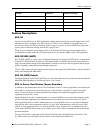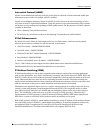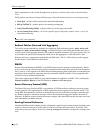
Software Supported
OmniSwitch 6800/6850/9000—Release 6.1.3.R01 page 23
Interswitch Protocol (AMAP)
Alcatel-Lucent Interswitch Protocols (AIP) are used to discover adjacent switches and retain mobile port
information across switches. By default, AMAP is enabled.
Alcatel-Lucent Mapping Adjacency Protocol (AMAP) is used to discover the network topology of Alca-
tel-Lucent switches in a particular installation. Using this protocol, each switch determines which switches
are adjacent to it by sending and responding to Hello update packets. For the purposes of AMAP, adjacent
switches are those that:
• Have a Spanning Tree path between them
• Do not have any switch between them on the Spanning Tree path that has AMAP enabled
IP DoS Enhancements
By default, the switch filters the following denial of service (DoS) attacks, which are security attacks
aimed at devices that are available on a private network or the Internet:
• ARP Flood Attack - OS6800/OS6850/OS9000
• Invalid IP Attack - OS6850/OS9000
• Multicast IP and MAC Address Mismatch - OS6850/OS9000
• Ping Overload - OS6850/OS9000
• Packets with loopback source IP address - OS6850/OS9000
The 6.1.3.R01 release provides support for these enhancements on the OmniSwitch 6800 Series,
OmniSwitch 6850 Series, and OmniSwitch 9000 Series as noted above.
IP Multicast Switching (IPMS)
IP Multicast Switching is a one-to-many communication technique employed by emerging applications
such as video distribution, news feeds, conferencing, netcasting, and resource discovery (OSPF, RIP2, and
BOOTP). Unlike unicast, which sends one packet per destination, multicast sends one packet to all devices
in any subnetwork that has at least one device requesting the multicast traffic. Multicast switching also
requires much less bandwidth than unicast techniques and broadcast techniques since the source hosts only
send one data stream to the ports on which destination hosts that request it are attached.
Destination hosts signal their intent to receive a specific multicast stream by sending a request to do so to
a nearby switch using Internet Group Management Protocol (IGMP). The switch then learns on which
ports multicast group subscribers are attached and can intelligently deliver traffic only to the respective
ports. This mechanism is often referred to as IGMP snooping (or IGMP gleaning). Alcatel-Lucent’s
implementation of IGMP snooping is called IP Multicast Switching (IPMS). IPMS allows OmniSwitch
9000 Series switches to efficiently deliver multicast traffic in hardware at wire speed.
Both IGMP version 3 (IGMPv3), which handles forwarding by source IP address and IP multicast destina-
tion, and IGMP version 2 (IGMPv2), which handles forwarding by IP multicast destination address only,
are supported. IPMS is supported on IPv4 and IPv6 (MLD) on the OmniSwitch 6850 Series and
OmniSwitch 9000 Series. The OmniSwitch 6800 Series only supports IPMS for IPv4.


















